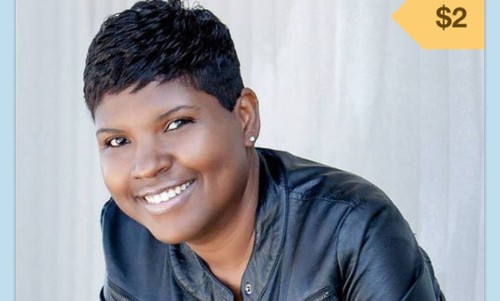“Help us and we will continue be the media that you want to hear–and that the media needs to hear.” — Elon James White, one of my jedi masters*, in a TWiBnation bumper soliciting donations.
Need is ever so interesting. It propels the most innate and pressing concerns to the extreme of death if left unchecked. It also gives license to the most obnoxious behavior. All impulse, under a microscope, whether trivial, benign or problematic, expresses a need. Does that need mean it’s “right”? Does it guarantee success, acceptance or justice? Naw. Other factors contribute to whether or not a need is “needed”. But the need tho…
I needed to cover Karinda Dobbins. I had just caught up with her at Lost Weekend Video and wanted to feature something, anything. I’ve blogged about Karinda a long time, I’ve exhausted the obvious. She’s a great storyteller, which is hard to condense into a quick quip. Videos are sparse, photos can’t capture her genius, audio is hard to come by. Sifting through Google I came across an interview with Karinda on We Want the Airwaves.
We Want the Airwaves is a need. It exists because it needs to: the creator needs to create it, audience needs the hear it, the landscape is fuller for it, and its scope is limitless. Produced by writer-illustrator-broadcastor Nia King, the podcast illuminates experiences, identities, and ideas with personal, heartfelt revolution. Many guests are new to my paradigm, concepts and definitions are still fuzzy from my (hopefully fading) ignorance, and everything feels more raw and less calculated than other podcasts emerging from public radio or pop culture cartels; you know, the mostly-white, overexposed, chart topping media brought to you by Stamps.com.
In the interview, Karinda talked about the “heckle effect” of doing comedy, called out institutions like SNL for their apparent inability to find funny women of color, and the risk of losing independent voices in the commodification of art. Nia offered queries and follow ups, nuanced and searching, relating her love of comedy and social awareness. I purchased the interview through Gumroad, a cloud based multimedia marketplace—thank God because my brother lost my copy of Stankonia in ‘01 and I haven’t trusted lossable content since—and it was conveniently accessible through Gumroad’s iPhone app. It cost $2. I hesitated at first. I was formed by free, limitless entertainment with horrible metadata. Kazaa, Bearshare, Pirate Bay. An early adolescence to early adulthood of brazen theft. I now have a job that can support $2 podcasts, but, more importantly I’m an artist. I understand the need.
Artists need money: concrete financial support. They also need therapy, a business acumen, and big spoon to hold all the shit they will eat, but let’s stick to the money for now. It’s the difference between a show with drink tickets and one with a door cut or passed hat. It separates an overly-edited, miserable commissioned list article from an emotional blog post that garners a grip of favs, RTs, likes and hearts. Funding enables a specific, tangible validation (and the precedence to ask for more).
Patreon, GoFundMe, PayPal, Etsy, Kickstarter, IndieGoGo. Technology is galvanizing peer to peer patronage, increasing an artist’s ability to demand (politely) for compensation, the incentive and feedback to help keep stride. I’m inspired and empowered by the work and savvy of peers like Nia King; their expression, their need encourages my own.
Yeah. But, it still needs to be good tho.
True. A respect for the grind isn’t a replacement for standards. You should find things that peaks your interest. But, while you’re entertained/distracted, your values should be reflected in the art you support; your support can in turn contribute to the conversation. It will get easier to back the underdog. It will become culturally en vogue to boost new voices. There will come a time when you’ll won’t be asked what you want, but rather what you need. So, what do you need? What do you need?
Thanks for reading!
[You can find Karinda’s interview on We Want the Airwaves here. You can also find a transcription here. You can support Nia on Patreon ($5 a month allows you to hear Karinda’s episode and more, though, not as conveniently as through a Gumroad contribution). Note: their interview took place in November of 2013.]
*”Jedi Masters” refers to a loose collection of artists that instruct and inform my trajectory, usually unknowingly, and mostly from afar. Examples of my personal jedi masters are W. Kamau Bell, Emily Heller, and CM Punk.
